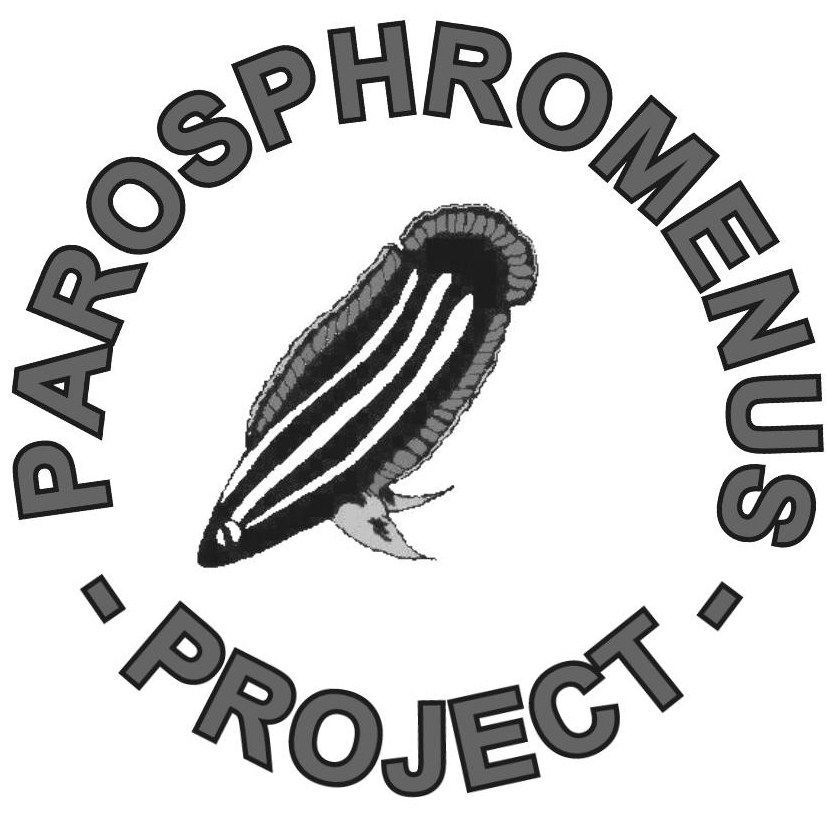Parosphromenus-Newsletter No.94 Bielefeld (Germany), December 25th, 2011

Dear Friends of the Licorice gouramis, once at the end of each year we report on our achievements to our advisory board. The report on the very successful year 2011 has been sent about two weeks ago. In January we will make it universally accessible on the website. But we shall use this last newsletter of the year for a short version to all members of the Parosphromenus-Project.
1. Steering Group: Recently Michael Beuscher (D, Mainz) joined the group again, after a time out for other duties. He will organize the delivery of offspring (“distribution”, see no. 8).
2. Meeting of the Group 2010: We met 7th May in Hanover (D) to discuss in detail the currently pending tasks of this year. Phone calls, emails and Skype helped at other times.
3. Website: 2011, we managed to establish our three-language website from the very beginning to nearly the end. This was the central achievement of the year, mainly due to Helene Schoubye’s work. It is the first website only on licorice gouramis and to the entire English- and French-speaking world it is the only comprehensive source of information about these fish on the internet. The translators have done quite a good job; we should mention mainly Christian Koepp and David Armitage (English) and Hugues van Besien (French), the latter has single-handedly translated the whole pages into French.
4. Internationalization: From what has been said it has become evident already: 2011 was a pivotal year for the internationalization of Parosphromenus project. We now have members not only in most of Europe, but also in the United States, Indonesia, Malaysia, Japan and even China.
5. Finance: We work voluntarily and therefore do not need a lot of money. A request to the members at the beginning resulted in donations amounting to € 1246.80, of which only a small part was spent; the rest (€ 905.00) will probably suffice for some time to come.
6. Census: We have continued with our half-year’s censuses, the last time with a modified and simplified methodology. Christian Hinz has compiled the many submissions with great overview and his clear representation renders the species list more stable than before. Especially new bintan-variants from Sumatra dominate the trade and leave many questions open; “wrong deissneris” are still plenty in stock.
7. Newsletter: Our newsletter has presently arrived at issue No. 93; in 2010 alone 12 issues were published, most of them in three languages.
8. The distribution service: Some bad mistakes happened in the beginning, but we analyzed the causes and reorganized the whole service, including other breeders. From January, Michael Beuscher will organize the contacts between breeders and buyers.
9. New Forum: A new internationally-oriented forum was integrated in the new website (English language) with entirely a new structure (Global, moderator: P. Finke, European, moderator: H. Schoubye, American, moderator initially T. Pinto, now M. Denaro, and Asian, moderator Jit Sin). It is a medium connecting countries and
continents. There are photos and movies available.
10. Travel: During the past year, at least five members of the project went for successful trips to the home areas of the licorice gouramis.
11. Cooperation: Structurally, the P-P is a network that joins together many individuals and many organizations. It attempts to integrate all people and institutions in the world interested in the genus Parosphromenus. Thanks to the new website we could expand this network significantly in 2011.
12. Media products: In particular in Germany, the Steering Group has published articles in aquarium journals. Presentations about the project have been given e.g. in Prague, Culmitz, Hamburg and Bonn (P. Finke).
13. Setbacks: Unfortunately, several members recently had to experience large losses in their stocks by a poisoning dog spray (!), purchased by another, and toxically contaminated white mosquito larvae bought in the pet trade (!).
14. Nature Conservation: The continuing dramatic situation of our fish, but of the traditional living places of many indigenous peoples in Southeast Asia, too, has been further aggravated by extensive deforestation and the use of environmental toxins. The project has therefore deliberately included the field of discussing “politics” in his work (website, forums, newsletter).
15. Resolution: We have co-signed a resolution of international conservation organizations addressing the German Federal Government and the European Commission regarding their promotion of “biofuels” for cars and planes which has been rejected as false and hypocritical. In these products, palm oil from Southeast Asia is used in considerable quantity.
16. Three statements at the end: “This is the type of project I have been looking for”, John Rowe (New York) told us in November. “I am delighted to contribute with translations to such a good project”, Christian Koepp (Berlin) wrote in February. “Why are there not more of such international projects that combine the aquarium hobby with a critical account of environmental politics?” wrote an employee of the Raffles Museum in Singapore in September in an Asian blog, which was forwarded to us. We welcome such statements, no question. We need it, because there is very much work indeed behind the nice face of the P-P.
This was a short report on that work in 2011. We repeat that the full text could be read on the homepage in January. Of course, we would be pleased about a feedback. In the January newsletter we will explain our plans for 2012.
We wish you all a peaceful and happy New Year! By order of the Steering Group: Peter Finke (December 25th, 2011)
A postscript (last minute): In 2012 we shall get a fourth language full version of our website: Chinese. Our friend David from Shanghai has started with the translations

